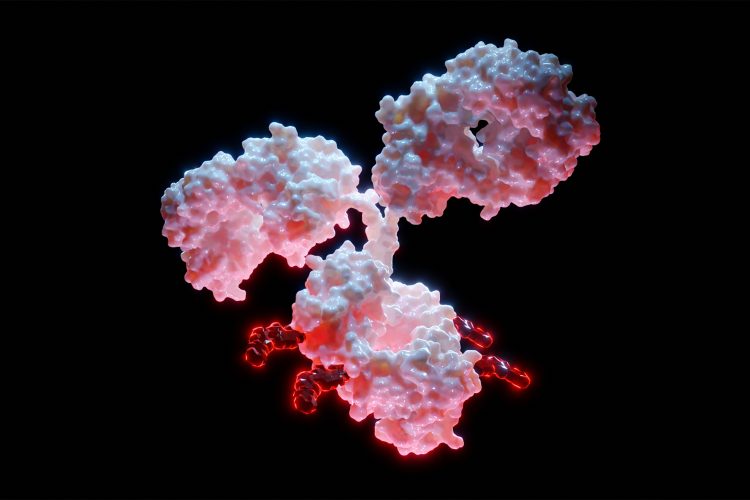How dual-targeting ADCs aim to tackle resistance
Posted: 8 July 2025 | Drug Target Review | No comments yet
Find out how dual-target ADCs and tumour-specific Treg depletion are shaping the next wave of targeted cancer therapies.


Dr Eleni Lagkadinou is on a mission to fast-track the future of cancer care. As Vice President of Oncology Early Development (OED) at AbbVie, she leads the charge on translating bold scientific ideas into real-world impact – and she’s doing it with a focus on some of the most tenacious cancers out there.
With a background spanning drug development, clinical strategy and translational research, Eleni brings more than two decades of experience to the role. Her team sits right at the edge of innovation, where discovery science meets clinical execution. Not only are they chasing new targets, they are also working to understand the biology behind resistance, discover biomarkers that matter and build smarter therapies from the ground up.
Whether developing next-gen ADCs or applying multiomics data to rethink response prediction, the OED group aims to accelerate progress and ensure promising science gets the chance to make a difference for patients, sooner rather than later.
Automation now plays a central role in discovery. From self-driving laboratories to real-time bioprocessing
This report explores how data-driven systems improve reproducibility, speed decisions and make scale achievable across research and development.
Inside the report:
- Advance discovery through miniaturised, high-throughput and animal-free systems
- Integrate AI, robotics and analytics to speed decision-making
- Streamline cell therapy and bioprocess QC for scale and compliance
- And more!
This report unlocks perspectives that show how automation is changing the scale and quality of discovery. The result is faster insight, stronger data and better science – access your free copy today
Dual-targeting ADCs
One of the standout programmes in AbbVie’s early oncology pipeline is ABBV-969 – a dual-targeting antibody–drug conjugate (ADC) addressing one of the most aggressive forms of prostate cancer: metastatic castration-resistant prostate cancer (mCRPC).
“mCRPC is a particularly aggressive form of the disease, and patients currently have limited treatment options,” said Eleni. “As prostate cancers may overexpress at least one of these targets or both, this dual-targeting approach increases the likelihood of binding to more tumour cells versus focusing on one target alone.”
As prostate cancers may overexpress at least one of these targets or both, this dual-targeting approach increases the likelihood of binding to more tumour cells versus focusing on one target alone.
ABBV-969 simultaneously targets two proteins, known as prostate-specific membrane antigen (PSMA) and six transmembrane epithelial antigen of the prostate 1 (STEAP1). Both proteins are overexpressed in prostate cancer and linked to tumour growth and survival. While there are already therapies under investigation that focus on PSMA alone, none are concurrently targeting STEAP1. The dual approach represents an effort to expand treatment efficacy across a broader subset of tumours, potentially improving outcomes.
“In a heterogeneous tumour type like mCRPC, dual-targeting approaches may potentially help overcome resistance versus single-targeting approaches,” Eleni explained. “The preclinical data we presented in an oral presentation at AACR, demonstrate the broader anti-tumour activity of dual-targeting ABBV-969 compared to ADCs targeting either STEAP1 or PSMA.”
ABBV-969 is currently in a Phase I clinical trial (NCT06318273), with early data reinforcing its potential to reach tumour cells that would otherwise escape detection through single-target strategies.
Novel immunotherapies
Beyond ADCs, AbbVie is also investing heavily in immuno-oncology (IO). A prime example is ABBV-514, a C-C Chemokine Receptor 8 (CCR8)-targeting monoclonal antibody designed to deplete tumour-resident regulatory T cells (Tregs) – immune cells that play a role in suppressing anti-tumour responses and promoting resistance to checkpoint inhibitors.
Checkpoint inhibitors revolutionised cancer therapy; however, significant unmet clinical needs remain. For example, not all patients respond to these treatments, and for those who do respond, resistance often eventually emerges.
“Checkpoint inhibitors revolutionised cancer therapy; however, significant unmet clinical needs remain. For example, not all patients respond to these treatments, and for those who do respond, resistance often eventually emerges. At that stage, the disease becomes more difficult to treat,” Eleni said. “Unleashing anti-tumour immunity by depleting Tregs is a promising therapeutic approach.”
While Tregs are essential to maintaining immune balance, their accumulation within tumours is linked to poor responses to immunotherapy. ABBV-514 was engineered to selectively deplete CCR8+ Tregs, a subset with high tumour infiltration and suppressive capacity, without broadly compromising immune function.
“Combining Treg depletion with other IO approaches might shift the landscape for tumours non-responsive or resistant to checkpoint inhibitors,” said Eleni. “We believe that the pathways targeted with this combination will provide synergistic benefits for patients.”
Preclinical studies presented at the 2025 American Association for Cancer Research (AACR) annual meeting highlighted strong monotherapy activity of ABBV-514 in models unresponsive to PD-1 inhibition. These findings support the strategy of combining ABBV-514 with budigalimab, AbbVie’s PD-1 antibody, which is currently being explored in early clinical studies (NCT05005403) for a range of solid tumours including non-small-cell lung cancer (NSCLC) and head and neck cancer.
Driving discovery through data
Recognising that better patient stratification is key to improving drug response and minimising resistance, AbbVie has fully embraced data-driven approaches in early drug discovery. This includes leveraging multiomics and clinicogenomic data – paired with real-world evidence – to better predict treatment outcomes and guide therapy selection.
“Multiomics/clinicogenomic data allows us to simultaneously mine vast sets of complex anonymised patient-level RWD using AI/machine learning,” Eleni explained. “This enables us to have a far better understanding of disease biology and resistance and uncovers new insights to help inform drug development.”
A recent study by AbbVie, presented at AACR, employed multiomics approaches in NSCLC to characterise long-term responses and mechanisms of acquired resistance to immunotherapy. These insights are directly informing both trial design and candidate selection in AbbVie’s preclinical and clinical pipelines.
Multiomics/clinicogenomic data allows us to simultaneously mine vast sets of complex anonymised patient-level RWD using AI/machine learning.
In parallel, AbbVie’s biomarker discovery efforts are helping to refine and optimise the company’s approach to precision oncology. At AACR, the team presented real-world analyses identifying clinically relevant biomarkers, including folate receptor alpha (FRa) in ovarian cancer and germline variants predictive of prognosis across solid tumours.
“Key to delivering this in the preclinical setting is the identification and evaluation of novel biomarkers that are clinically relevant and then developing therapies informed by these biomarker insights,” she added.
Such findings may help with treatment sequencing, matching patients to the right therapies, and even informing combination strategies – a cornerstone of personalised cancer care.
Most recently, AbbVie presented new clinical data for key early-stage studies at the American Society of Clinical Oncology (ASCO) Annual Meeting, highlighting several of their novel ADCs in hard-to-treat cancers. Promising data for Temab-A, also known as telisotuzumab adizutecan, a next-generation, c-Met-targeted ADC, was presented in patients with pre-treated, epidermal growth factor receptor (EGFR)-mutated, non-squamous, NSCLC. Additionally, new data for ABBV-706, targeting SEZ6, in patients with high-grade neuroendocrine neoplasms showed anti-tumour activity and manageable safety in this rare and aggressive tumour type.
The broader pipeline
When asked which drug modalities are most exciting within AbbVie’s early pipeline – from ADCs to multispecific antibodies and CAR-T therapies – Eleni offered a balanced view.
“It’s not really about one approach being more exciting than another, but having a wealth of different innovations in our toolbox to tap into, and best meet the profound clinical needs that still exist for many cancer patients around the world.” she said.
AbbVie’s oncology R&D efforts span both blood cancers and solid tumours. The company’s strategy is rooted in a deep understanding of cancer biology and a commitment to selecting the right therapeutic modality based on the biology of the disease and patient needs.
By integrating insights from biomarkers, resistance mechanisms and real-world data, the goal is to rationally design therapies that are both effective and durable – reducing trial-and-error in the clinic and bringing therapies to patients faster.


Dr Eleni Lagkadinou is Vice President of Oncology Early Development (OED) at AbbVie, where she leads a cross-functional team dedicated to advancing early-stage research and development, driving innovation in oncology and supporting AbbVie’s mission to deliver novel treatment options to patients.
Integrated within AbbVie’s R&D organisation, the OED group is dedicated to delivering high-quality early data that accelerate development programmes and enable the faster initiation of registrational studies.
She holds an MD and PhD and has contributed to understanding mechanisms of resistance in acute leukaemias. With a career spanning over two decades, Eleni has demonstrated her commitment to following the science, leading early development teams and seeking improved ways to develop better medicines for patients in need.
Related topics
Antibodies, Antibody Discovery, Biomarkers, Cancer research, Drug Development, Drug Discovery, Drug Discovery Processes, Immuno-oncology, Immuno-oncology therapeutics, Immunotherapy, Machine learning, Oncology, Precision Medicine
Related conditions
metastatic castration-resistant prostate cancer (mCRPC), Non-small cell lung cancer (NSCLC)
Related organisations
AbbVie








